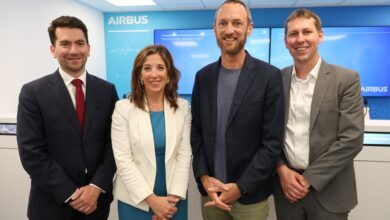First zero-emissions fuel cell ferry in the U.S. arrives in San Francisco

Considered the first commercial maritime vessel in the United States powered entirely by hydrogen fuel cell technology, it will begin taking passengers on rides along the San Francisco waterfront in late spring.
A new all-electric, zero-emissions ferry arrived in San Francisco by tug boat from Washington State. Considered the first commercial maritime vessel in the United States powered entirely by hydrogen fuel cell technology, it will begin taking passengers on rides along the San Francisco waterfront in late spring.
Developed with $3 million in state funding, the 75-passenger catamaran called the Sea Change is part of a push by the San Francisco Bay Area Water Emergency Transportation Authority, which operates ferry service in a large part of the bay, to eventually phase out diesel ferries, which produce black puffs of noxious pollutants as they chug through the water.
The fuel cell electric ferry is a pilot project meant to demonstrate another zero-emissions alternative for passenger ferries and the larger shipping industry, which at almost 3% of global greenhouse gas emissions, has a bigger carbon footprint than air transportation.
Pace Ralli said that using fuel cells to produce electricity is “a monumental step because hydrogen and hydrogen-based fuels are seen as a pathway to zero-carbon solutions for large, high-horsepower applications like ships.”
The Sea Change can operate for 16 hours before being refueled at the end of the day from a tank at the harbor, similar to the diesel ferries in the fleet, Ralli said. The major difference is that there aren’t any emissions other than water vapor.
California Air Resources Board provided the $3 million grant to the Bay Area Air Quality Management District to work with Switch Maritime and other companies to develop the technology used in the Sea Change, part of $20 million in grants from cap-and-trade auction proceeds for advanced technology vehicles and equipment.
The ferry cost about $14 million to build; additional vessels will be cheaper, likely costing 30% more to make than traditional diesel ferries, Ralli said.
